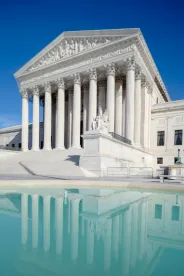In a unanimous decision authored by Justice Ruth Bader Ginsburg, the United States Supreme Court ruled on February 21, 2018 that the anti-retaliation provisions of the Dodd–Frank Wall Street Reform and Consumer Protection Act (“Dodd-Frank” or the “Act”) only cover whistleblowers who report potential violations of the securities laws to the Securities and Exchange Commission (the “SEC” or the “Commission”) and not those who only report internally. The decision reversed an earlier ruling by the Ninth Circuit Court of Appeals and resolved a circuit split on the issue. As a result, employees who only report potential violations internally must pursue anti-retaliation claims under the less generous provisions of the Sarbanes Oxley Act of 2002 (“SOX”).
Digital Realty Trust v. Somers
Mr. Paul Somers, an executive for the San Francisco-based real-estate investment trust, alleged that he was terminated by Digital Realty Trust after raising concerns that another executive had intentionally eliminated certain internal corporate controls in violation of securities laws. He did not, however, report these concerns to the SEC. Invoking Dodd-Frank’s anti-retaliation provisions, Somers brought suit against his former employer in federal court. Affirming the denial of Digital Trust’s motion to dismiss, the Ninth Circuit held that Dodd-Frank covered Somers, despite his failure to report to the SEC. Notwithstanding the fact that Dodd-Frank defines “whistleblower” as an “individual who provides information . . . to the Commission,” the Ninth Circuit found the term to be ambiguous and deferred to the Commission’s interpretation that it also covers those who only raise their concerns internally.
The Supreme Court Weighs In
As discussed in a prior post, during oral arguments the Supreme Court justices appeared skeptical of Somers’ position in light of the express terms of the statute. In its decision, the Court rejected that position unequivocally: “Dodd-Frank’s text and purpose leave no doubt . . . Somers did not provide information ‘to the Commission’ before his termination, . . . so he did not qualify as a ‘whistleblower’ at the time of the alleged retaliation.”
State of the Law
Internal whistleblowers, of course, can still pursue anti-retaliation claims under SOX. SOX’s anti-retaliation provisions are significantly less generous than Dodd-Frank’s, however. For example, an aggrieved employee must file a complaint with the Department of Labor and await administrative review before bringing a lawsuit in federal court. The statute of limitations for such a claim is only 180 days, and the potential for back pay recovery is lower as well (full back pay v. double back pay under Dodd-Frank).
The Decision’s Impact on Internal Whistleblower Programs
After the Supreme Court granted certiorari in Somers, some speculated that a decision limiting Dodd-Frank’s anti-retaliation protections would undermine internal whistleblower programs by encouraging employees to bypass such processes and go straight to the SEC instead. Whether that will be the case in the wake of the Court’s decision remains to be seen, but such concerns may be overblown, given the monetary incentives of the SEC’s whistleblower award program.
Under that award program, an individual who provides the SEC with original information that leads to a successful enforcement action resulting in sanctions exceeding $1 million is entitled to an award equal to anywhere between 10% and 30% of the sanction. SEC rules explicitly state that, in determining what percentage to award, internal reporting will be weighed favorably and, conversely, that interfering with or hindering an internal compliance process will be counted against the whistleblower. In addition, for purposes of determining whether a whistleblower’s information was “original,” SEC rules deem the SEC tip to have been submitted at the time of any internal report, so long as the whistleblower reported to the SEC within 120 days thereafter.





 />i
/>i

